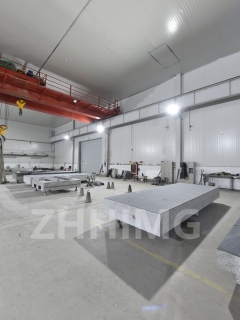Granite vs. Cast Iron and Mineral Casting Lathes: A Cost-Effectiveness Analysis
When it comes to choosing the right material for a lathe, the decision often boils down to cost-effectiveness and long-term maintenance. Two popular materials for lathe construction are cast iron and mineral casting, each with its own set of advantages and disadvantages. This article aims to explore the cost-effectiveness of these materials, particularly in the context of long-term use and maintenance.
Cast Iron Lathes
Cast iron has been a traditional choice for lathe construction due to its excellent vibration-damping properties and durability. Cast iron lathes are generally more affordable upfront compared to their mineral casting counterparts. However, they come with some drawbacks. Over time, cast iron can be prone to rust and may require regular maintenance to keep it in optimal condition. Additionally, the weight of cast iron can make transportation and installation more challenging and costly.
Mineral Casting Lathes
Mineral casting, also known as polymer concrete, is a newer material used in lathe construction. It offers superior vibration damping and thermal stability compared to cast iron. While the initial cost of a mineral casting lathe is generally higher, the long-term benefits often outweigh this initial investment. Mineral casting is resistant to rust and requires less maintenance, reducing the overall cost of ownership over time. Furthermore, its lighter weight can make transportation and installation easier and less expensive.
Long-Term Use and Maintenance Costs
When considering long-term use and maintenance, mineral casting lathes tend to be more cost-effective. The reduced need for maintenance and the material's inherent resistance to environmental factors like rust make it a more competitive option in the long run. On the other hand, while cast iron lathes may be cheaper initially, the ongoing maintenance costs can add up, making them less cost-effective over time.
Conclusion
In summary, while cast iron lathes may offer a lower initial cost, mineral casting lathes provide better long-term value due to their durability, reduced maintenance needs, and superior performance. For those looking to make a cost-effective investment in a lathe, mineral casting is the more competitive material when considering long-term use and maintenance costs.
Post time: Sep-14-2024

